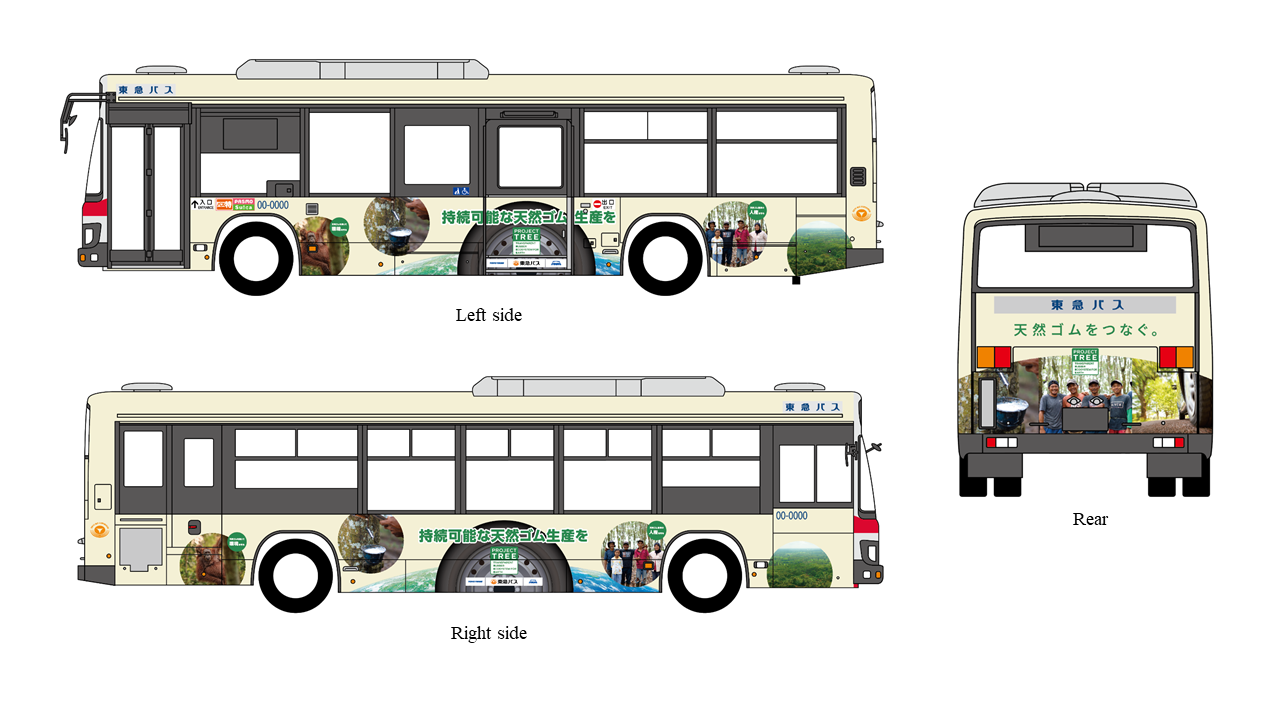ITOCHU Announces the Introduction of Tires Manufactured through PROJECT TREE, a First in the Bus Industry
Promotion of the project for the traceability and sustainability of natural rubber, a raw material of tires
September 20, 2023
ITOCHU Corporation (headquartered in Minato-ku, Tokyo; Keita Ishii, President & COO; hereinafter “ITOCHU”) announced today that Tokyu Bus Corporation (headquartered in Meguro-ku, Tokyo; Takashi Furukawa, President & CEO; hereinafter "Tokyu Bus") will be the world's first bus company to participate in PROJECT TREE, an initiative led by ITOCHU to achieve the traceability and sustainability of natural rubber. ITOCHU will further promote this project with the additional support by Toyo Tire Corporation (headquartered in Itami-shi, Hyogo; Takashi Shimizu, Representative Director, President & CEO, hereinafter "Toyo Tire"), a supplier of tires to Tokyu Bus.
Natural rubber is the main raw material of the tires fitted onto Tokyu Bus vehicles. Tire production accounts for about 70% of global natural rubber consumption, and approximately 85% of global production relies on smallholders, mainly in Southeast Asia such as Thailand and Indonesia. While the demand for natural rubber is expected to grow continuously because of the global progression of motorization, it is becoming increasingly essential to address issues such as forest preservation and support for smallholders in natural rubber production areas.
Considering these circumstances and aiming to contribute to the creation of sustainable natural rubber supply chains, as tires are essential in the operation of its business, Tokyu Bus has decided to participate in PROJECT TREE because the company is aligned with the initiative to improve traceability and sustainability in the natural rubber industry.
Toyo Tire, a tire supplier, will manufacture tires through PROJECT TREE using natural rubber whose origin can be traced by PROJECT TREE and that are assigned using the mass balance approach,*2 and it will supply PROJECT TREE supporting tires to Tokyu Bus. Tokyu Bus will switch about 60% of the tires it replaces annually to PROJECT TREE supporting tires, gradually transitioning their bus tires to contribute to the creation of sustainable natural rubber supply chains. Moreover, Tokyu Bus will operate a wrapped bus*3 in Shibuya-ku and Setagaya-ku areas in Tokyo for three months starting on Bus Day, September 20.
Through PROJECT TREE, Tokyu Bus and ITOCHU will contribute to the achievement of SDG #1, No poverty, SDG #8, Decent work and economic growth, SDG #9, Industry, innovation and infrastructure, SDG #12, Responsible consumption and production, SDG #13, Climate action, SDG #15, Life on land, and SDG #17, Partnerships for the goals.
-
*1
PROJECT TREE: Transparent Rubber Ecosystem for Earth
PROJECT TREE is a project promoted by ITOCHU with the goal of improving traceability and sustainability.
A smartphone app-accessible production area tracking system developed by ITOCHU records information such as the volume, time, date and location of transactions using blockchain technology and shows this information on a map.
These raw materials are processed apart from other materials and sold to tire manufacturers as natural rubber whose origin can betraced. One feature of this system is that it pays out a part of the sales of the tires manufactured through cooperative production to rubber suppliers and smallholders who do not have smartphones or bank accounts are provided with agricultural goods, fertilizers and training to increase productivity. In addition, ITOCHU will implement a series of risk mitigating activities based on the results of its supply chain risk assessments. These assessments are carried out in consultation with the international NGOs, Proforest and SNV, who also audit them.
The goals of PROJECT TREE are to enable all natural rubber stakeholders, including natural rubber processing companies, tire wholesalers and retailers, automobile manufacturers and consumers to be involved in the project and distribute the tires manufactured through cooperative production around the world. PROJECT TREE is also expected to contribute to the policies and the achievement of the goals of the Global Platform for Sustainable Natural Rubber (GPSNR). -
*2
Mass balance approach
The mass balance approach is an approach used in a wide range of industries including the palm oil and paper industries. It is a method for assigning certain characteristics to a portion of products produced, depending on the quantity of raw materials with these characteristics that are introduced, when mixing materials that possess certain characteristics with materials that do not possess these characteristics in the process of processing products from raw materials and distributing them. - *3 Design of the wrapped bus
|
* Main message of the design: Sustainable Natural Rubber for a Sustainable Future |

